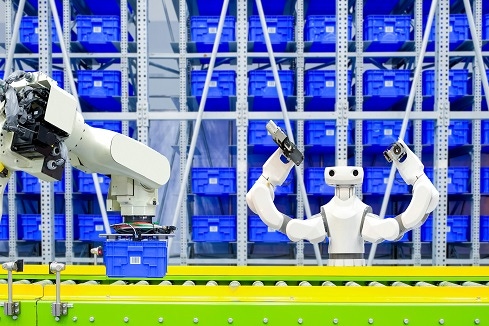Although the adoption of this technology will be widespread, there is still time for workers to get ahead of the curve so that they do not become obsolete once the integration is complete.

Every day, people can see the increased reach that intelligent machines have on our society, from self-checkouts at grocery stores to more intensive robots in manufacturing. Much of the labor force has seen these developments and met them with hesitation, wondering if their jobs were at risk. But workers should not fear this change, as it is simply a shift in how business will be done. It's not eliminating human workers altogether.
While workers worry about their jobs being replaced by intelligent machines in their future, they need to realize that these machines are quickly becoming the present condition of various industries. Automation is the status quo because it leads to a significant increase in productivity. But that doesn’t mean that human workers are disposable. Instead, it means that they should expect the nature and responsibilities of their job to change.
Several industries have already incorporated robots into their operations, and it isn’t just in manufacturing. Skilled workers such as surgeons have also seen their work supplemented by robots. But it should be looked at as such: a supplementation. The purpose of incorporating intelligent machines is not to replace human workers entirely. It is to increase their productivity by making their completion of tasks more efficient.
In the manufacturing industry alone, robot density per worker has doubled in the past five years. However, it takes time for these machines to reach their optimal level of productivity and cost-efficiency, allowing workers to pick up the skills they need to transition their work from one being hands-on and directly completing the task to one where they oversee the work of these machines.
Ready or Not …
Workers need to understand that this shift is coming, whether they like it or not. And with the automation revolution set to occur within the next 15 years, they must act now before it is too late to change their position. Workers can become an integral part of this new way of conducting business by picking up additional skills and undergoing further training. If workers don’t fall victim to the mindset that robots are after their jobs, they will see that there are enormous opportunities opening for them that they may not have otherwise had.
Workers need to embrace the shift toward automation. People should not think that robots are taking their jobs. Instead, they should know that the skills they need to be successful in their occupation are changing. When a robot is installed, it doesn’t immediately begin to perform a task self-sufficiently. It requires oversight, and sometimes even operation, from its human counterparts.
One of the main things that must change before this automation revolution can occur is that the larger culture needs to embrace this shift towards intelligent machines. When pop culture is perpetuating the myth that machine intelligence is inherently evil, it is hard to convince the public that this change actually is beneficial to them. To help this shift occur, we need to ensure that these perceptions change on a mass scale.
Another thing that needs to occur before the widespread transition to automation is more acceptance of intelligent machines from a legal viewpoint. Although certain standards and protections need to be in place to protect those working alongside robots, further regulation can hinder innovation. That innovation is necessary for the field to progress to a point where human and machine workers coexist successfully.
At this point, it would be futile to resist the automation revolution, because it has already begun. However, workers can and should take steps to ensure that they are adapting with these changing industries. Although the adoption of this technology will be widespread, there is still time for workers to get ahead of the curve so that they do not become obsolete once the integration is complete.
About the Author(s)
You May Also Like







